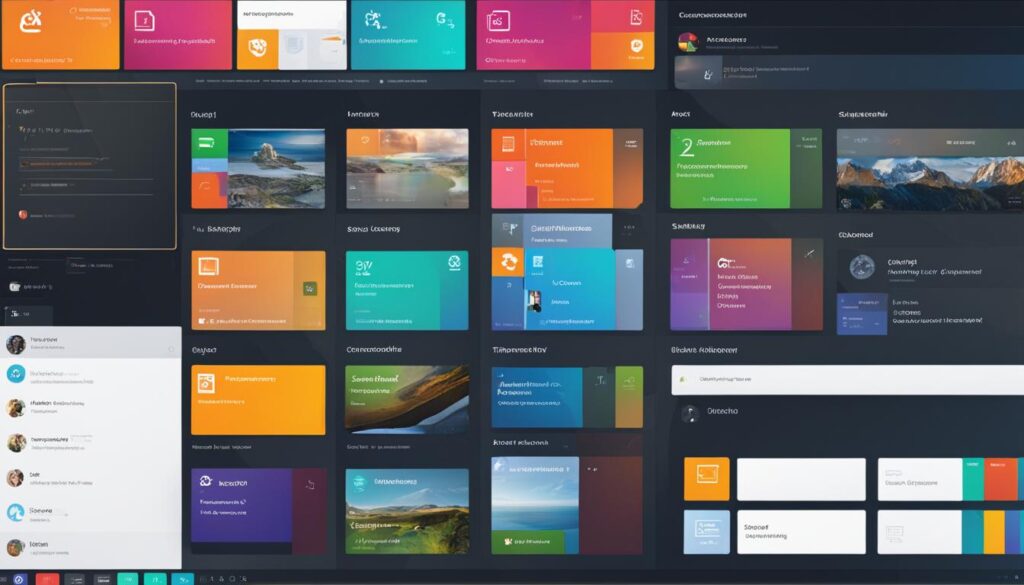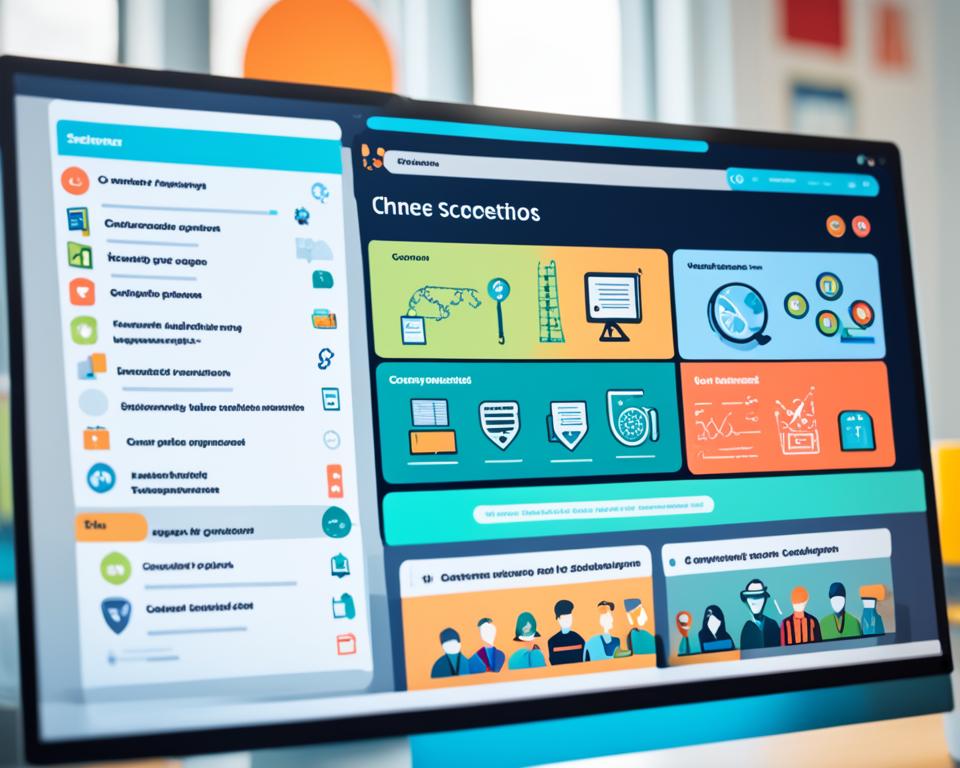Online learning is revolutionizing the education landscape, providing unprecedented opportunities for individuals to pursue their educational goals. With the advent of online education, learning is no longer confined to traditional classrooms. Whether you’re a busy professional seeking career advancement or a student looking for flexible learning options, online education offers the freedom to learn anytime, anywhere.
Also known as e-learning or distance learning, online education harnesses the power of technology to bring virtual classrooms to life. It enables learners to access high-quality educational resources, collaborate with fellow students, and engage with knowledgeable instructors—all through the convenience of the internet.
By embracing online education, you gain the flexibility to customize your learning experience according to your schedule and individual needs. From technical skills to academic courses, online education provides a vast range of options to explore. Additionally, it offers diverse perspectives and eliminates geographical boundaries, allowing you to interact with a global community of learners.
One of the key advantages of online education is its affordability. With reduced costs such as travel expenses and textbooks, online courses provide an economical alternative without compromising on educational quality. Moreover, online education fosters the development of crucial time management skills as you learn to juggle your studies alongside other commitments.
The future of online education holds exciting prospects. As technology continues to evolve, we can expect advancements in social learning, adaptive learning, artificial intelligence, video learning, learning management systems, microlearning, and customized learning experiences. This digital revolution will reshape education and make learning more accessible and inclusive than ever before.
Key Takeaways:
- Online education provides personalized and flexible learning opportunities.
- It offers a wide range of courses and eliminates geographical boundaries.
- Online education is affordable, fostering the development of time management skills.
- The future of online education lies in social learning, adaptive learning, and artificial intelligence.
- Technology advancements will reshape education and make it more accessible and inclusive.
What is Online Learning?
Online learning, also known as eLearning, distance learning, or internet learning, is a form of education that harnesses the power of the internet and technology to deliver educational content to learners. With online learning, you have the flexibility to learn from any location and at your own pace. Whether you’re a full-time working professional or a busy parent, online learning allows you to fit education into your schedule.
One of the key benefits of online learning is the ability to customize your learning experience. You can choose from a wide range of courses and programs that cater to your specific interests and goals. This personalized approach enables you to develop diverse skills and knowledge in areas that are most relevant to you.
The latest developments in online learning have brought about interactive formats such as gamification and augmented reality/virtual reality (AR/VR), making the learning experience even more engaging and immersive. Gamification incorporates elements of games into the learning process, making it enjoyable and motivating. AR/VR technology allows learners to interact with virtual environments, providing a unique and hands-on learning experience.
Online learning has revolutionized education by breaking down geographical barriers and providing access to quality education for learners around the world. It is transforming the way we learn, making education more accessible, flexible, and convenient.
Advantages of Online Education
Online education offers numerous benefits that make it an attractive option for learners. Whether you’re a working professional, a busy parent, or simply prefer the flexibility of self-paced learning, online education caters to your unique needs. Let’s explore the advantages that online education brings:
Flexibility
One of the biggest advantages of online education is the flexibility it provides. You have the freedom to learn at your own pace, fitting your studies around your existing commitments. Whether you’re a full-time professional or a busy parent, online education allows you to access course materials and lectures at any time and from anywhere with an internet connection. This flexibility eliminates the constraints of physical classrooms and rigid schedules, enabling you to learn at your own convenience.
Wide Range of Course Options
Online education offers a vast array of course options to suit your interests and career goals. Whether you’re looking to expand your knowledge in a specific subject area, acquire new skills, or pursue a degree, there is an extensive range of online courses and programs available. From business and technology to arts and humanities, you’ll find courses that align with your passions and aspirations.
Diverse Perspectives
Online education attracts learners from different countries and backgrounds, creating a diverse learning community. This diversity of perspectives enriches the learning experience, enabling you to engage with classmates, instructors, and guest speakers from around the world. By interacting with individuals with varied experiences and viewpoints, you gain a broader understanding of the subject matter, fostering a more comprehensive and inclusive educational experience.
Affordability
Online education is often more cost-effective than traditional in-person education. Without the need for physical classrooms, commuting, or accommodation expenses, online courses tend to be more affordable. Additionally, many online educational platforms offer financial aid, scholarships, or discounted tuition rates, making education accessible to a wider range of learners. By opting for online education, you can save on expenses while still receiving a quality education.
Time Management Skills
Online education requires self-discipline, organization, and effective time management skills. By pursuing courses online, you learn to prioritize tasks, manage your time efficiently, and meet deadlines. These valuable skills transcend the digital learning environment and can be applied to various aspects of your personal and professional life. Online education helps you develop the discipline and self-motivation necessary for success in today’s fast-paced world.
Overall, online education provides the flexibility, variety, diverse perspectives, affordability, and opportunity to develop essential time management skills. It empowers learners to customize their learning journey and achieve their educational goals while balancing other commitments. Experience the benefits of online education and unlock a world of knowledge and opportunity.
Social Learning and Online Education
Social learning is becoming increasingly popular in the realm of online education. It harnesses the power of technology, interactive videos, and reading materials to elevate the learning experience. This innovative approach to learning is proving to be more productive, straightforward, and effective compared to traditional classroom teaching methods.
With social learning, you can actively participate in the learning process by engaging with others, utilizing interactive videos, and immersing yourself in relevant reading materials. By incorporating technology, social learning creates a collaborative and engaging environment that enhances your understanding and retention of knowledge.
Through interactive videos, you can visualize complex concepts, observe real-life demonstrations, and engage with multimedia content that reinforces your learning. These videos provide a dynamic and immersive learning experience that heightens your engagement and understanding.
“Social learning combines human interaction, technology, and group dynamics to create an engaging learning environment.”
Furthermore, social learning encourages you to explore various perspectives and engage in meaningful discussions with fellow learners and instructors. By actively participating in group activities and discussions, you can gain fresh insights, broaden your knowledge, and develop your critical thinking skills.
Reading books also plays an essential role in social learning. As you delve into relevant reading materials, you can deepen your understanding of the subject matter and gain exposure to diverse viewpoints. Reading books facilitates self-paced learning and encourages you to reflect on the concepts presented.
One of the key advantages of social learning is its impact on productivity and effectiveness. By actively engaging with others and incorporating interactive elements into your learning experience, you can enhance your motivation, focus, and overall learning outcomes. The interactive nature of social learning keeps you actively involved, enabling you to absorb information more effectively.

Through social learning in online education, you can harness the power of technology and human interaction to create a truly transformative learning experience. By actively participating in discussions, engaging with interactive videos, and exploring relevant reading materials, you can optimize your learning potential and achieve greater effectiveness in your educational journey.
Adaptive Learning and Online Education
Adaptive learning is a powerful approach that caters to the unique needs of learners, providing them with a customized learning experience. Unlike traditional one-size-fits-all methods, adaptive learning focuses on individual preferences and learning styles, ensuring that each student receives a personalized course tailored to their specific requirements. This approach empowers learners to take control of their education, enabling them to achieve their learning goals more effectively.
One of the key benefits of adaptive learning is the provision of instant feedback. Students receive immediate responses to their assessments, allowing them to identify areas of improvement and make necessary adjustments to their learning strategies. This real-time feedback enhances the learning process and encourages continuous growth and development.
Another advantage of adaptive learning is the provision of personalized pathways. Based on the learner’s strengths, weaknesses, and progress, the adaptive learning system dynamically adjusts the course content and resources to provide the most relevant and meaningful learning experience. This personalized approach ensures that learners engage with materials that align with their abilities and learning preferences, maximizing their understanding and retention of knowledge.
Adaptive learning also addresses the individual needs of learners by providing them with resources and support that specifically cater to their requirements. Whether it’s additional practice exercises, interactive simulations, or supplementary materials, learners have access to a wide range of resources tailored to their unique learning needs. This personalized support fosters a supportive and inclusive learning environment, enabling learners to thrive and succeed.
The Benefits of Adaptive Learning in Online Education:
- Customized learning experience based on individual preferences and learning styles
- Instant feedback to enhance learning and facilitate improvement
- Personalized pathways that offer relevant and meaningful course content
- Resources and support to address individual needs and foster success
| Benefits of Adaptive Learning in Online Education |
|---|
| Customized learning experience |
| Instant feedback for improvement |
| Personalized pathways and relevant course content |
| Resources and support tailored to individual needs |
Adaptive learning in online education revolutionizes the learning experience, making it more personalized, engaging, and effective. By catering to individual needs, adaptive learning empowers students to take ownership of their education and achieve their full potential. Through adaptive learning, online education becomes a dynamic and inclusive environment that adapts to each learner’s unique requirements, providing them with the resources and support they need for success.
Artificial Intelligence and Online Education
Artificial Intelligence (AI) is revolutionizing the online learning market, transforming the way education is delivered. With AI-based online learning platforms, tasks that traditionally require human intelligence can now be accomplished efficiently.
AI has the ability to analyze users’ data and provide personalized solutions to enhance learning experiences. It can perform tasks such as speech recognition, decision-making, and translation, making the learning process more efficient and effective.
One of the key advantages of AI technology in online education is its capability to adapt to individual student learning levels and provide relevant content. By considering students’ previous experience, knowledge, skills, learning styles, and preferred pace, AI ensures that each student receives personalized instruction that aligns with their unique needs.
This personalized approach allows students to learn at their own pace, increasing engagement and motivation. AI-based platforms can recommend relevant content based on students’ interests and preferences, creating a customized learning experience.
By harnessing the power of AI, online education is able to bridge the gap between human intelligence and technology, offering a seamless integration that enhances the learning process.
Benefits of AI in Online Education:
- AI can analyze student data and provide personalized solutions.
- It offers adaptive learning experiences based on individual student needs.
- AI-based platforms recommend relevant content for enhanced learning.
- Personalized pace allows students to learn at their own speed.
By leveraging AI technology, online education can provide students with a tailored and efficient learning experience, fostering their academic growth and success.
Video Learning in Online Education
Video learning is an essential component of online education, offering a dynamic and immersive learning experience. Through the integration of camera footage, text, graphics, animation, and audio, video learning creates a multimedia environment that enhances subject material demonstration.
Video learning enables educators to visually represent complex concepts, making it easier for learners to grasp difficult topics. By incorporating real-life examples and demonstrations through camera footage, students can gain a deeper understanding of the subject matter.
The use of multimedia elements in video learning not only enhances engagement but also caters to different learning styles. Visual learners benefit from graphics and animation, while auditory learners can reinforce their understanding through audio explanations. This comprehensive approach ensures that learners receive a holistic and effective learning experience.
In addition, video learning allows for asynchronous learning, enabling students to revisit and review course content at their own pace. This flexibility empowers learners to tailor their education to their individual needs and schedules, further enhancing the effectiveness of the learning process.
Benefits of Video Learning in Online Education:
- Enhanced engagement and interactivity
- Improved comprehension of complex concepts
- Catering to different learning styles
- Greater flexibility and accessibility
- Opportunity for self-paced learning
Video learning provides a stimulating and interactive learning environment, revolutionizing the way online education is delivered. It elevates the learning experience by incorporating multimedia elements and subject material demonstration.
| Advantages of Video Learning | Examples |
|---|---|
| Enhanced engagement | Interactive quizzes, immersive simulations |
| Improved comprehension | Demonstrative experiments, step-by-step tutorials |
| Catering to different learning styles | Visual diagrams, audio explanations |
| Flexibility and accessibility | Accessible on various devices, on-demand access to recordings |
| Self-paced learning | Ability to pause, rewind, and review videos |
Learning Management Systems in Online Education
In the world of online education, Learning Management Systems (LMS) are essential tools that revolutionize the way educators design, manage, and deliver courses. LMS provides a comprehensive platform that enables efficient practices and seamless communication between educators and students. By leveraging technology-based education software, LMS makes online learning a dynamic and engaging experience.
With LMS, educators have the freedom to design and document their courses, ensuring that lesson plans cater to the specific needs of their students. They can create interactive and multimedia-rich content that enhances the learning experience. LMS also allows educators to organize and manage course materials, making it easier for students to access required resources from anywhere at any time.
One of the key advantages of LMS is its ability to streamline lesson planning. Educators can create and schedule lesson plans, ensuring that each class is structured and aligned with the curriculum. This efficient practice saves time, enhances productivity, and promotes effective course delivery.
LMS also plays a crucial role in technology-based education. It provides a centralized platform where students can engage in discussions, submit assignments, and interact with their peers. This fosters collaboration and creates a virtual classroom environment that mirrors traditional face-to-face interactions.
To understand the significance and impact of Learning Management Systems in online education, consider the following benefits:
- Efficient course management and organization
- Seamless communication between educators and students
- Customized lesson plans and interactive content
- Access to course materials anytime, anywhere
Learning Management Systems empower educators to embrace technology and deliver a personalized and effective learning experience. With the right LMS, online education becomes an engaging and inclusive journey for both educators and students.
Social Learning and LMS
Social learning is enhanced through the utilization of LMS platforms. By integrating collaborative tools and discussion forums, LMS enables students to engage in peer-to-peer interactions and learn from each other. This creates a sense of community and fosters a deeper understanding of the subject matter.
Adaptive Learning and LMS
LMS allows for adaptive learning, catering to the individual needs of each student. By analyzing data and tracking student progress, LMS can provide personalized recommendations and resources, adapting the learning experience to match each learner’s unique abilities and learning style.
Artificial Intelligence and LMS
Artificial Intelligence (AI) is revolutionizing the field of online education, and LMS platforms are at the forefront of this transformation. AI-powered LMS can analyze student data, identify learning gaps, and provide targeted interventions. This enables educators to deliver tailored instruction and support, ensuring that students receive the guidance they need to succeed.

Learning Management Systems streamline and enhance every aspect of online education. From course design and organization to personalized learning experiences and efficient practices, LMS is the cornerstone of technology-based education. Embracing Learning Management Systems is key to unlocking the full potential of online education.
Conclusion
Online education has emerged as a powerful tool in unlocking the potential of e-learning. It offers flexibility, accessibility, and customized learning experiences for students. With the advancements in technology shaping the learning landscape, online education is the future of education.
By embracing technology such as AI, VR, and AR, online education can further enhance the educational experience and prepare students for the challenges of the future. It has already transformed traditional teaching methodologies and provided new opportunities for educators and learners.
Embracing the power of online education not only opens doors to a brighter and more accessible future for learners worldwide but also fosters inclusive learning environments. Online education breaks down barriers, allowing individuals from different backgrounds and locations to access quality education and connect with diverse perspectives.
The benefits of online education are vast, from the flexibility it offers to the wide range of course options available. As the future of education unfolds, technology will continue to play a key role in shaping the way we learn and teach. By embracing online education, individuals and institutions can pave the way for a transformative and inclusive learning journey.
FAQ
What is online learning?
Online learning, also known as eLearning, distance learning, or internet learning, is a form of education that uses the internet and technology to deliver educational content. It allows students to learn from anywhere at their own pace, offering customized learning experiences and diverse skill development opportunities.
What are the advantages of online education?
Online education offers several advantages. It provides flexibility for students to pursue their courses from anywhere and at any time. There is a wide range of course and program options available online. Online courses attract learners from different countries and backgrounds, providing a broader range of perspectives. Online education is also affordable and time-saving, allowing students to develop their time management skills.
How does social learning fit into online education?
Social learning is gaining popularity in online education. It utilizes technology, interactive videos, and reading materials to enhance the learning process. Social learning combines human interaction, technology, and group dynamics to create an engaging learning environment. It is more productive, straightforward, and effective compared to traditional classroom teaching methods.
What is adaptive learning in online education?
Adaptive learning is a form of custom learning that addresses the unique needs of learners. It offers personalized courses based on individual preferences and learning styles. Adaptive learning provides instant feedback, personalized pathways, and resources to help learners achieve their learning goals. It moves away from the one-size-fits-all approach to education.
How is artificial intelligence used in online education?
Artificial intelligence (AI) is transforming the online learning market. AI-based online learning platforms can maintain and accomplish tasks that typically require human intelligence. AI can analyze users’ data and provide efficient solutions, such as speech recognition, decision-making, and translation. AI technology helps determine the expected levels of learning from students and provides relevant content based on their previous experience, knowledge, skills, learning styles, and preferred pace.
What is video learning in online education?
Video learning is an integral part of online education. It combines camera footage, text, graphics, animation, and audio to create a multimedia learning experience. Video learning allows for the demonstration of subject material, making it one of the most effective ways to learn online.
How do learning management systems (LMS) support online education?
Learning management systems (LMS) play a significant role in online education. LMS allows educators to design, document, and register courses and study materials. It enables efficient management of online learning practices, replacing traditional analog methods. LMS provides educators with the capabilities to create lesson plans and manage courses effectively, while students can access required courses and study materials online.
What is the future of online education?
Online education has emerged as a powerful tool in unlocking the potential of e-learning. The future of online education lies in social learning, adaptive learning, artificial intelligence, video learning, learning management systems, and the development of customized learning experiences. Embracing technology and advancements like artificial intelligence, virtual reality, and augmented reality will further enhance the educational experience and prepare students for the challenges of the future.
How is online education transforming traditional teaching methodologies?
Online education has transformed traditional teaching methodologies and provided new opportunities for educators and learners. It offers flexible and accessible learning opportunities, personalized learning experiences, and a wide range of course options. Online education utilizes technology to create engaging and interactive learning environments.
What is the impact of online education on learners worldwide?
By embracing the power of online education, individuals and institutions can shape a brighter and more accessible future for learners worldwide. Online education offers flexibility, affordability, and diverse perspectives, allowing learners from different countries and backgrounds to access quality education and develop crucial skills for their personal and professional growth.





